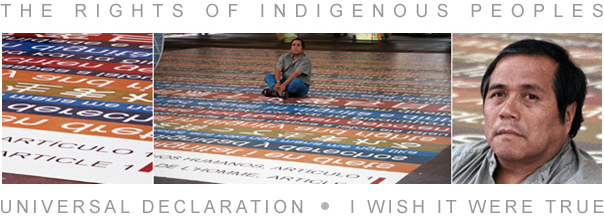
Eusebio Loreto Julio, Nahua from Guerrero, Mexico, Universal Forum of Cultures, Barcelona 2004
Article 1 is painted on the floor in different languages
Search by translation
ARTICLE 1
All human beings are born free and equal in dignity and rights.
They are endowed with reason and conscience and should act towards one another in a spirit of brotherhood
INDIGENOUS ISSUES
20 January 1999
Report of the working group established in accordance with
Commission on Human Rights resolution 1995/32
"The noble and humane words of the Universal Declaration of Human Rights, which we celebrate today, shine brightly and with great hope for those who are suffering a long night of injustice. We appreciate the role of the new Deputy High Commissioner for Human Rights and congratulate you on the new appointment. For so many people, especially many Indigenous Peoples, the words of the Declaration are filled with promises, and we wish they were actually true.
"ALL ARE EQUAL BEFORE THE LAW AND ARE ENTITLED WITHOUT ANY DISCRIMINATION TO EQUAL PROTECTION BEFORE THE LAW ... I wish it were true that all countries would surrender their laws that treat Indigenous Peoples unequally and deprive us of our rights.
"EVERYONE HAS THE RIGHT TO LIFE ... I wish it were true for those Indigenous Peoples in Africa and elsewhere who are driven from their lands and who can no longer adequately sustain themselves.
"EVERYONE HAS THE RIGHT TO OWN PROPERTY ... I wish it were true that the Australian Aboriginal Peoples and all Indigenous Peoples could enjoy the right to claim, unhindered, native title to our lands.
"NO ONE SHALL BE ARBITRARILY DEPRIVED OF HIS OR HER PROPERTY ... I wish it were true for the Maasai, the Miskitos, the Innu Indian Peoples and others whose lands are not yet recognized or respected.
"EVERYONE HAS THE RIGHT TO FREEDOM OF THOUGHT, CONSCIENCE AND RELIGION ... How I wish this were true for Indigenous Peoples whose sacred sites are despoiled and desecrated.
"NO ONE SHALL BE SUBJECTED TO TORTURE OR TO CRUEL, INHUMAN OR DEGRADING TREATMENT OR PUNISHMENT ... I wish it were true that Indigenous Peoples did not suffer so much and so often die in custody throughout the world.
"EVERYONE HAS THE RIGHT TO A SOCIAL AND INTERNATIONAL ORDER ... I wish it were true for so many Indigenous Peoples who suffer the barbarity and lawlessness of others. I wish for an international order in which we indigenous peoples have a full and equal role.
"We can still make the promises of the Universal Declaration come true. One great step toward fulfilling these promises will be for the countries of the world to adopt the Declaration on the Rights of Indigenous Peoples.
"Fifty years after States adopted the Universal Declaration of Human Rights, we ask ourselves what people they were thinking of when they wrote those words. For according to our understanding, as Indigenous Peoples, human rights cannot be simply individual rights, nor even just rights of human beings, but rather must be rights of all life, of nature, the forests, rivers, plants and animals.
"So, when we speak of our rights as Indigenous Peoples, we are speaking of rights of collectivities constituted of plants, animals and human life. Respecting human rights means avoiding the annihilation of diversity. Nature itself shows us the need for diversity for life.
"We salute the women and men who wrote and adopted the Universal Declaration in 1948. Perhaps they were thinking about the true meaning of human rights. But over the years, those that seek political and economic power have tarnished the ideals that inspired the Universal Declaration.
"Such is the case in the Amazon, for example, with the destruction of nature and mineral resources. From Alaska to Patagonia, from the Atlantic to the Pacific, in fact through the world, transnational companies are killing life itself, not just Indigenous Peoples.
"If we can achieve balanced, just and equal relations among peoples, we can prevent conflicts, discord and confrontations such as those that have taken place in Central and South America, Africa, Asia, the Pacific and in other parts of the world where Indigenous Peoples live. To respect human rights is to achieve peace."
Distr.
GENERAL
E/CN.4/1999/82
20 January 1999
Original: ENGLISH
COMMISSION ON HUMAN RIGHTS
Fifty-fifth session
Item 15 of the provisional agenda

POLITICS OF TRANSFORMATION

S I T E M A P M A P A D E L S I T I O
dbn@dialoguebetweennations.com
Copyright Natalie Drache 1999